- Home
- Encyclopedia
- Francis E. Warren: A Massachusetts Farm Boy Who...
Francis E. Warren: A Massachusetts Farm Boy Who Changed Wyoming
Many young men headed west in search of new adventures following the Civil War, but few—if any—matched the financial and political success that Francis Emroy Warren achieved in Wyoming.
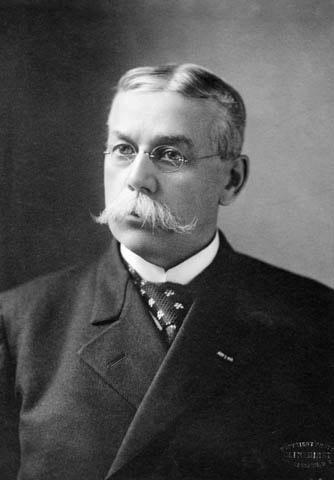
Warren became wealthy, first as a merchant and then as a rancher, while simultaneously working his way up the state's political ladder. After twice being appointed as Wyoming's territorial governor, the staunch Republican was the first to be elected governor when Wyoming became a state in 1890. Warren then served in the U.S. Senate for more than 37 years, rising to the powerful position of chairman of the Appropriations Committee for eight years before his death in 1929.
Unabashedly using pork-barrel politics and patronage, Warren built a political machine in Wyoming that was virtually unbeatable. The veteran senator's political rivals, while raising some serious charges during his career—including the alleged illegal fencing of public land—never put a dent in his popularity with constituents.
But Warren's life was not free of failure or tragedy. And while he could point to numerous accomplishments during his lengthy tenure in the U.S. Senate, several of the key pieces of legislation related to public land and grazing policies he pushed for years were ultimately rejected.
Near the end of his life, this career politician made some surprisingly discouraged comments about the path he chose to follow. In a February 1928 International News Service interview, Warren advised young men not to enter politics if they felt confident enough to do anything else. ''It ought to be the last hope of any young man starting out in life, unless he has the unselfish motives of serving his country without reward,'' he said. "All governments are ungrateful.''
Early years
Warren, the son of a farmer, was born in Hinsdale, Mass., on June 20, 1844. Once considered well to do, his father saw the family farm start to falter when Francis was 8 years old, and the youngster dropped out of school to help out. At 15, he began working on a neighbor's dairy farm, earning $13 a month. He managed to go back to school at the local Hinsdale Academy, which was run by the Congregational Church, for two years.
When the Civil War broke out, Warren wanted to volunteer to serve in the Union Army, but his father insisted that his son not enlist until his 18th birthday. At that time, he joined the 49th Massachusetts Infantry, Company C.
During a May 27, 1863, raid on Port Hudson in Louisiana, Cpl. Warren volunteered to be part of a unit that went in first, but it met heavy fire from the Confederates. Most of the advance force were wounded or killed. Warren received a serious scalp wound in the attack and was initially mistaken for dead. An alert doctor noticed he was alive and had him pulled from a trench, or Warren might have been buried in a mass grave. He recovered fully from his wounds.
For his efforts on the battlefield that day, Warren was cited for "bravery above and beyond the call of duty." Thirty years later, while serving in the U.S. Senate, he received the Congressional Medal of Honor for his heroic action.
He returned to his Massachusetts home after the war, but his fascination with the West was too powerful to keep him there. He headed west, working briefly in railroad construction in Iowa before boarding a Union Pacific train bound for what soon would become Wyoming Territory.
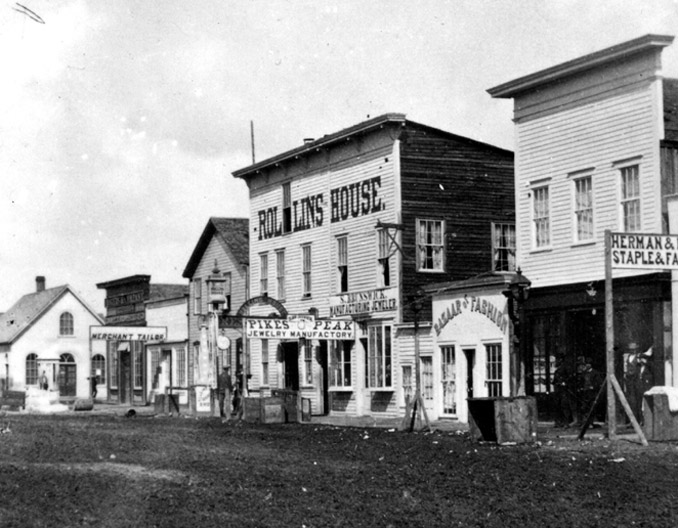
New hometown
When Warren arrived in Cheyenne in May 1868, he was bewildered by what he encountered at the train station: two brass bands. The young traveler asked, "What notable person is being serenaded?" Both bands, he learned, were welcoming newcomers on behalf of the town's two biggest gambling houses, inviting the greenhorns to try their luck at the tables.
"Cheyenne at that time was a city of shanties and tents, camps and covered wagons. The population was migratory," Warren recalled in an interview with The New York Times a few months before his death. "The railroad having been built further to the west, everyone was discussing the probability of a permanent town, and the prevailing opinion seemed to be that in six months not much more than a stake would be left to mark the site of Cheyenne. ... For some reason I could not make myself subscribe to that gloomy prophecy."
Despite his attraction to Cheyenne, Warren quickly discovered that life in the rough-and-tumble town came with some discomfort and definite risks. He used a cot improvised from some pieces of packing boxes as his bed, and remembered later, "Every man slept with from one to a half-dozen revolvers under his pillow, for depradations [sic] of every character could be expected at any hour, day or night."
Warren's first job in his new hometown was working as a clerk in a crockery and hardware store owned by a fellow Massachusetts native, A.R. Converse, for whom Converse County was later named. He later became Converse's partner and then bought the business in 1877, renaming it the Warren Mercantile Company.
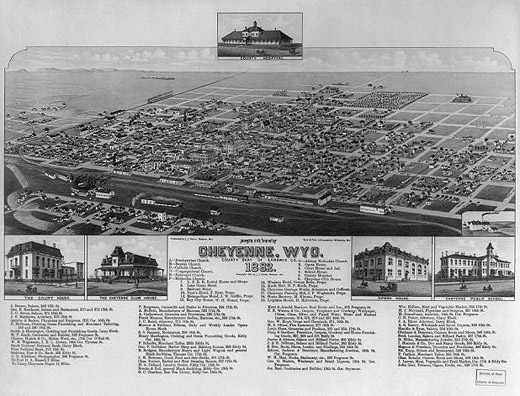
No official records exist to determine who became Wyoming's first millionaire, but if Warren did not earn that distinction, he was certainly one of the first in the territory to amass such a fortune. In the fall of 1883, he formed the Warren Livestock Company, a large cattle and sheep operation that eventually grew to 150,000 acres. He also owned the Cheyenne and Northern Railroad and the Brush-Swan Electric Company, which provided the first electric power to Cheyenne.
Warren was responsible for many of the buildings that still grace downtown Cheyenne as well as some that did not survive. The Plains Hotel, the Majestic Building and the Lincoln Theater are all still standing and in business, though each has undergone renovations. An opera house that the city's cattle barons put Warren in charge of building in 1882 seated 1,000 patrons and brought world-famous performers to Cheyenne, but the structure was destroyed by a fire in 1902.
Warren married Helen M. Smith of Middlefield, Mass., on Jan. 26, 1871, and the couple had two children, Frances and Frederick. His wife died in 1902, and at age 67, Warren married his second wife, Clara LeNaron Morgan, on June 28, 1911.
Early political career
Warren won his first attempt at seeking public office in 1872 at the age of 29 when he was elected to a two-year term in the Territorial Legislature. He served as president of the Council—the upper chamber—of the Territorial Assembly in 1873, the same year he was elected to the Cheyenne City Council, and was instrumental in securing the city's first lighting system. He served as territorial treasurer in 1876, 1879, 1882 and 1884.
He was elected mayor of Cheyenne in 1885, but his tenure as the city's chief executive was short-lived. Republican President Chester A. Arthur, with less than a week before his term ended, appointed Warren as the territorial governor to fulfill the unexpired term of William Hale, who died in office. Arthur predicted his Democratic successor, Grover Cleveland, would have trouble replacing Warren, since the Senate was controlled by the Republican Party. He was right; Warren stayed in the governor's office for the next 20 months.
Warren's political future was heavily influenced by his actions during a crisis in his first year as territorial governor, when white workers in Rock Springs on Sept. 2, 1885, killed 28 Chinese mine workers, injured 15 others, sent hundreds fleeing and burned down their homes. The rioters were angry that they had been displaced in Union Pacific coal mines by the Chinese, who were willing to work for lower wages.
Warren arrived in Rock Springs by train the next morning to personally handle the tense situation, which had law enforcement requesting that he send in military troops. Warren, who went to Evanston to prevent further violence against Chinese coal miners there, sent a telegram to Cleveland asking him to dispatch federal troops to southwest Wyoming, and the president complied.
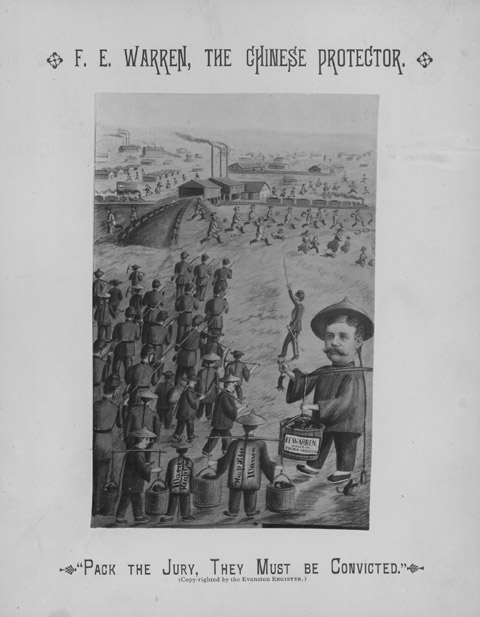
By protecting the surviving Chinese miners, Warren risked the wrath of white workers, but he had no qualms about his response to the Rock Springs Massacre. He told a St. Louis newspaper reporter that the tragic incident was "the most damnable and brutal outrage that ever occurred in any country." A grand jury refused to indict anyone.
Union Pacific officials were grateful for the governor's response to the massacre and petitioned President Cleveland to keep Warren in office, maintaining that his dismissal would be viewed as a triumph for those who sympathized with the rioters.
Cleveland kept Warren in the governor's office until November 1886, giving him the opportunity to push an ambitious agenda through the Territorial Legislature. Without Warren in the governor's office during this critical time as the territory approached statehood, when many important decisions were made about state institutions and public policies, Wyoming's future might have been considerably changed.
The 1886 session
The governor was working with a Republican majority in both chambers, but he privately let it be known that he wasn't impressed with the quality of the lawmakers. He wrote to Wyoming Territory’s congressional delegate, Republican Joseph M. Carey, that the legislators were "a heterogeneous mob of discordant spirits -- working men, dudes, asses, fools, etc., represent the comments on the street -- and I must confess with shame, quite deservedly."
But they did get behind Warren's proposals, including appropriations to build an insane asylum in Evanston and a school for the deaf, dumb and blind in Cheyenne. The latter was built but never opened. On their own initiative, legislators approved $150,000 to construct a capitol in Cheyenne and $50,000 to establish a university in Laramie. Warren signed both measures.
The Territorial Legislature backed Warren's recommendation to adopt a comprehensive law that established procedures for the appropriation of water for irrigation. Also approved was a new revenue law that, beginning in 1887, allowed Wyoming to tax much land—including land granted to the Union Pacific Railroad –that had previously escaped taxation. The land had not yet been taxed on the technicality that a final patent had never been granted to the owners. By 1889, acreage on Wyoming's assessment rolls had increased fifteen fold.
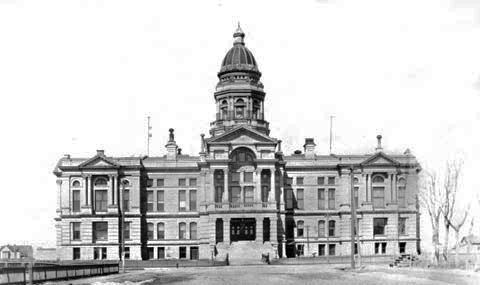
Cleveland finally did replace Warren as territorial governor, but he was reappointed to the position by Republican President Benjamin Harrison on April 9, 1889. He pressed for statehood, writing to the Department of the Interior secretary that "the people of Wyoming want statehood. Men who have braved all the perils of pioneer life, have laid broad and deep the foundation of future homes, towns and cities, and have treasured up the means that is to uphold the commonwealth, are not unmindful of the advantages of state government."
Warren teamed with Carey on the statehood issue, which was finally approved by Congress in 1890. Warren had the honor of being the first elected governor of the new state, but only six weeks later he resigned on Nov. 24, 1890, when the Legislature—after appointing Carey to a Senate seat—deadlocked on selecting a second senator. Warren was nominated and he won on the lawmakers' seventh ballot.
Carey, who had filled in for Warren on the campaign trail when the governor became ill, had told debate audiences that if he, Carey, was elected to the Senate, Warren would stay in Cheyenne in the governor's office. It's unknown if word of Carey's assurances to voters about his political future ever reached Warren.
Senate career
Though the two men were never personal friends, Warren and Carey had worked together to achieve statehood for Wyoming. But Warren's relationship with Carey rapidly deteriorated once the two tried working together in the U.S. Senate. In a candid letter to E.A. Slack, editor of the Cheyenne Sun, on Aug. 15, 1891, Warren confided that Carey "never misses an opportunity to do me injury by word if not deed."
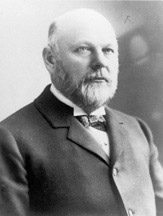
"I am getting a large amount of bitterness piled up inside me in spite of myself," he added, "and I am inclined to think the day may not be far distant when some of the bile must be thrown overboard."
Warren's Senate term expired in 1893, and the Legislature, which at that time still chose the U.S. senators, couldn't agree on its next Senate choice, and thus Wyoming was only represented by Carey for the next two years. However, lawmakers sent Warren back to the Senate in 1895, and he remained in the chamber until his death in 1929.
Carey, meanwhile, was cast aside in 1895 by Republicans in the Legislature, who chose to send Clarence D. Clark of Evanston to Washington to serve in the Senate with Warren. Carey speculated that his opposition to silver coinage—which Warren also had voted against—was responsible for his defeat.
Questions of metal vs. paper currency were among the most politically controversial of the time. Warren hedged on the issue and indicated he would be willing to support a pro-silver plank in the state party's platform, while Carey stuck to his guns. Other observers said legislators did not want to elect two senators from the capital city.
In a Dec. 12, 1894 letter to M.C. Barrow, Warren declared that he refused to stand aside for Carey. "I know of no reason on 'God's footstool' why I should always play second fiddle in the Carey-Warren or Warren-Carey combination. ... If either J.M.C. or F.E.W. go to the Senate in 1895 it will be F.E.W.," he wrote.
From his return to the U.S. Senate in 1895 until his death, Warren was the undisputed leader of the Republican Party in Wyoming. The "Warren Machine," as it became known, rewarded political friends and punished its enemies. Fenimore Chatterton, who had led the Republican rebellion against Warren in the Legislature in 1893 and kept him out of the Senate for two years, wrote that "for many years thereafter many stones were placed in my pathway."
"He is the boss of Wyoming, with a powerfully entrenched political machine of the 'pork barrel' and 'patronage' type," wrote Sen. Robert La Follette of Wisconsin. "He is one of the high moguls of the Old Guard."
Warren obtained more than $1 million in appropriations for public buildings and sites around the state between 1902 and 1912. As chairman of the Senate Military Affairs Committee, he saw to it that Fort D.A. Russell in Cheyenne became a full regimental post, and that Fort Mackenzie in Sheridan was well supported. He also helped keep federal troops at Fort Washakie until 1909.
Warren served as chairman of the Committee on Irrigation and Reclamation of Public Lands. He made the unconditional cession of all federal public lands to the states his main goal. If enacted, Warren's proposal would have handed over millions of acres to state governments in the West to do with as they saw fit. The Preemption and Homestead Acts would become history, and a new era of local control would begin.
Warren linked the cession issue to the need for water development and reclamation. He said irrigated lands for farming and the grazing lands associated with them would obviously increase in value. The "key to prosperity in perpetuity," he maintained, was a system of regulated grazing districts and rental fees that would return money to the irrigation project, thus benefiting both the grazers and local farmers who provided food.
But while Warren developed a coalition of Western senators, governors and newspaper editors who backed cession, it never came close to reality. The issue wasn't a priority for Senate leaders, and opponents gained traction with their claim that the policy could end up being a huge land grab for the Union Pacific Railroad.
Political fallout from the 1892 Johnson County War may have made it inevitable that the cession issue would eventually go nowhere. That conflict pitted that county's sheriff and homesteaders against a group of vigilantes who tried to eliminate alleged cattle rustlers identified by the Wyoming Stock Growers Association. The violence and subsequent courtroom battles made headlines throughout the nation, and launched a backlash against the ranchers, who would have been the biggest beneficiaries of Warren's bill.
At times, Warren fought back the urge to go back to private life and leave politics behind. In a March 12, 1892, letter to a friend, D.C. Bridges, he wrote, "I entertain a quite general regret that I am not spending my time at home trying to make a little money out of my private business, rather than to be absent from home spending money in attempting to do something for Cheyenne and Wyoming and the entire western country."
Family tragedy
Warren made other attempts to reform the nation's grazing laws, but personal tragedy limited his ability to fully concentrate on the effort, and he let other Western senators handle the issue. In 1915, his daughter, Frances, who had married Gen. John "Black Jack" Pershing, perished in a fire in their quarters at the Presidio military base in San Francisco, along with three of the couple's four children.
Pershing, who had been away from home, rushed back to California along with Warren, and the two grief-stricken men accompanied the bodies back to Cheyenne, where they were laid to rest in the Warren family plot at Lakeview Cemetery.
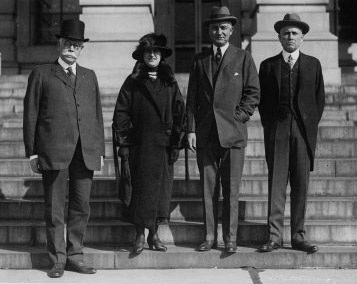
Later years
In his later years, Warren was extremely busy as chairman of the Senate Appropriations Committee, where he helped push the agendas of two Republican presidents, Warren G. Harding and Calvin Coolidge. He backed stiffer tariffs, especially those that protected the farm and livestock industries.
Wyoming's senior senator was a strong supporter of women's suffrage throughout his career. He voted against Prohibition.
Warren remained active until his final days in the Senate, and often amazed younger colleagues with his stamina. Wyoming's U.S. Rep. Teno Roncalio, a Democrat, described the senator in a profile he wrote for the state's 75th anniversary in 1965:
"There was not a wrinkle in his face. His snowy white hair, the big bristling white mustache, the bowlegs that came from a life in the saddle, the springy step, made him a prominent figure signifying the strength of the frontiersman. To his last day in the Senate it was his habit to walk up the steps, sometimes almost taking them on the run, to the Senate floor."
On Nov. 24, 1929, at age 85, Warren died in Washington, D.C., after an attack of pneumonia and bronchitis that lasted about three weeks. His wife, son and son-in-law were at his bedside.
Four days later, as snow fell, a flag-draped casket was rolled on an artillery caisson in Lakeview Cemetery. Following a 13-gun salute, a U.S. senator who attended the ceremony remarked that the weather was "characteristic of the storms [Warren] breasted all his life."
Warren had served 37 years and four days in the U.S. Senate, a record for the longest service that lasted until the 1960s. Warren is now ranked 12th on the all-time list of longest-serving senators.
On Jan. 1, 1930, Fort D.A. Russell near Cheyenne was renamed in honor of Warren. In 1949, the fort officially became the Francis E. Warren Air Force Base.
When Warren died, he was the last U.S. senator who had served in the Union Army during the Civil War. One Confederate veteran, Rep. Charles M. Stedman of North Carolina, was in the House. According to an Associated Press article written after Warren's death, the two men were close personal friends, and they delighted observers with the way they greeted each other.
"Hello, Johnny Reb. How you be?" Warren would say.
The old Southerner would always laugh and respond, "Howdy yourself, you Yankee."
Stedman was a member of the House delegation that attended Warren's funeral, and he said a final goodbye to his friend, a Yankee who made a huge impact on the Cowboy State.
Resources
Primary Sources
- "Death Claims Senator Francis E. Warren," Casper Daily Tribune, 25 November 1929.
- Warren, Francis E. "Message of the Governor to the Wyoming Legislature, Ninth Assembly." Territory of Wyoming, 1886.
- "Warren's Senate Service Was Longest in History," Casper Daily Tribune, 25 November 1929.
Secondary sources
- Ammon, Richard T. "Cheyenne Greatly Influenced by Francis E. Warren." City of Cheyenne, n.d. Accessed Aug. 9, 2013 at http://www.cheyennecity.org/DocumentCenter/Home/View/3445.
- Dew, Jay Randell. "Frustrated Fortunes: Francis E. Warren and the Search for a Grazing Policy." University of Oklahoma Graduate College dissertation, 2007.
- "Francis E. Warren Overcame Humble Beginnings to Build Political Empire.“ Wyoming Tribune Eagle, SunDAY Magazine, 15 June 1986.
- "Francis E. Warren Papers: Biography." University of Wyoming collection, American Heritage Center, Laramie, Wyo.
- "Hall of Valor." Military Times, website, projects.militarytimes.com/citations-medals-awards/recipient.php?recipientid=874
- Larson, T.A. A History of Wyoming. University of Nebraska Press, Second Edition, Revised, 1978.
- Roncalio, Teno. "Francis E. Warren: 'Father of Senate.'" Casper Star-Tribune, 24 July 1965.
- Taliaferro, Mary Ann. "Francis E. Warren a Pioneer Among Early Political Figures." Casper Star-Tribune, 23 March 1980.
For Further Reading
- Bowers, Carol. “‘Chinese Warren’ and the Rock Springs Massacre.” The Equality State: Essays on Intolerance and Inequality in Wyoming. Mike Mackey, editor. Powell, Wyo.: Western History Publications, 1999, 37-62.
Illustrations
- The portrait of F. E. Warren, the 1890 photo of the Wyoming State Capitol and the photo of the four governors on the Capitol steps are from the Wyoming State Archives. Used with permission and thanks.
- The 1869 photo of downtown Cheyenne is by the pioneer photographer William Henry Jackson, from the U.S. Geological Survey photo library. Used with thanks.
- The 1882 image of the Cheyenne opera house is from Wyoming Tales and Trails. Used with thanks.
- The bird’s-eye view of Cheyenne in 1882 and the portrait of Joseph Carey are from the Library of Congress. Used with thanks.
- The image of the anti-Warren poster is from the American Heritage Center at the University of Wyoming. Used with permission and thanks. In the image, troops protect the Chinese laborers. Words on one laborer’s back read, “Warren Heap Good,” and on another, “Heap Like Warren.” Warren himself, in Chinese garb and pigtail, appears to be holding a mouse, and a basket that reads, “F.E. Warren, Dealer in China Provision.” In the background, white miners and their families flee the troops.
